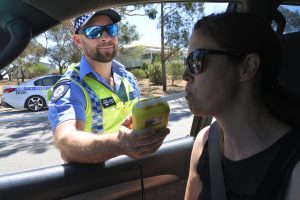 Imagine you’re stopped by a police officer, and the officer suspects you’ve been drinking. They ask a few questions and mention they smell alcohol. The officer then reaches for a small handheld device and says, “I just need you to blow into this for me.” That device is a portable breath test, commonly called a PBT. What you decide to do can have an impact on your court case if you are charged with DUI (called ‘OVI’ in Ohio) or another alcohol-related offense.
Imagine you’re stopped by a police officer, and the officer suspects you’ve been drinking. They ask a few questions and mention they smell alcohol. The officer then reaches for a small handheld device and says, “I just need you to blow into this for me.” That device is a portable breath test, commonly called a PBT. What you decide to do can have an impact on your court case if you are charged with DUI (called ‘OVI’ in Ohio) or another alcohol-related offense.
What Is a PBT?
A PBT is small roadside breath-testing device police use to estimate your blood alcohol content (BAC). Most PBTs use fuel cell technology, which detects alcohol by measuring an electrical current. When a person breathes into the device, any alcohol in the breath reacts with the fuel cell’s platinum-coated electrodes, creating a small electric current. The strength of that current is proportional to the amount of alcohol in the breath sample. The result appears on the screen within a couple of minutes.
Unlike the larger breath-testing machines used at the police station, PBTs are not designed for evidentiary use in court. They are simply investigative tools. The National Highway Traffic Safety Administration (NHTSA) cautions against putting too much weight on the results, stating: “the PBT provides direct indication of the BAC level. It does not indicate the level of the subject’s impairment. Impairment varies widely among individuals with the same BAC.”
It’s also worth noting that PBTs are known for giving inaccurate readings, especially if they haven’t been properly calibrated or if outside factors are present. Things like mouthwash, medical conditions, or ambient alcohol can skew the results. In other words, the number that shows up on a PBT may not accurately reflect your actual BAC.
Do You Have to Take a PBT?
If an officer asks you to take a breath test, it’s important to understand your rights and obligations. In Ohio, you are not legally required to submit to a PBT before you’ve been arrested. In Ohio, there is no automatic license suspension for refusing a PBT. However, an officer may still use your refusal to take a PBT, along with other observations such as odor of alcohol or slurred speech, to help justify an arrest.
The situation is different if you are asked to take a breath test after being arrested. Constitutionally, you do not have a right to refuse a breath test after being arrested. Under Ohio’s implied consent laws, a breath test refusal (after being arrested) results in an Administrative License Suspension being imposed immediately.
How are PBTs Used in Court?
PBTs are different from the breath-testing machines used at police stations. Those machines go through strict maintenance and calibration procedures and are approved by the state of Ohio for evidentiary use. PBTs don’t meet the same standards and are not approved for evidentiary use. As a result, PBTs are not admissible in court as evidence for an OVI charge. In a trial, the number from the device cannot be presented to the judge or jury to prove intoxication.
PBTs are sometimes used in non-OVI cases. Any charge that involves alleged intoxication, such as Using Weapons While Intoxicated or Disorderly Conduct, could involve a PBT during the investigation. The takeaway is the same: the results can be used by the officer to make the arrest decision, but the results should not be shown to the judge or jury in a trial to prove impairment.
What To Do With This Information
Knowing how PBTs work and how they’re treated in court can make a big difference in your case. Whether you are facing an OVI or another charge involving alcohol, it’s important to remember that a PBT result might justify an arrest, but it shouldn’t be used to prove guilt at trial. If a PBT was administered in your case, a knowledgeable criminal defense attorney can help you challenge its use and protect your rights.
 Columbus OVI/DUI Attorney Blog
Columbus OVI/DUI Attorney Blog

